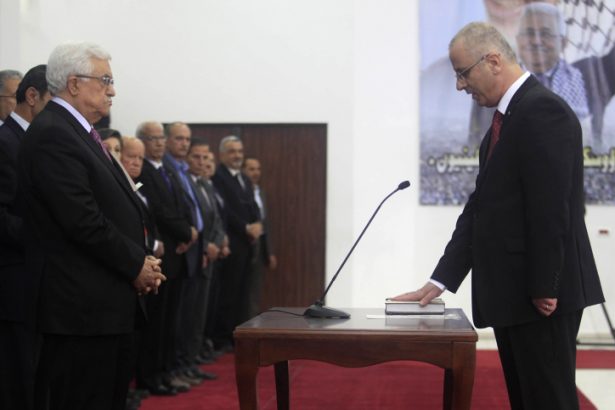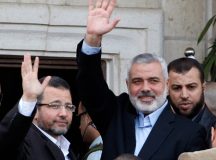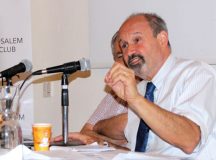Where is Palestinian politics going? Fathom advisory editor Ben Cohen talked to David Pollock.
Hamas
‘It’s not unreasonable and it’s actually instructive in some respects,’ said David Pollock, the Kaufman Fellow at The Washington Institute for Near East Policy, when I asked him if one can draw a sensible comparison between Hamas and IS (or ISIL, as it’s often called). Having served in senior State Department positions during the Bill Clinton and George W. Bush administrations, Pollock knows both the Israeli-Palestinian and Iraqi theatres intimately.
Common to Hamas and IS, Pollock argued, is the existence of an ‘uncompromising goal and the adoption of violent means towards that goal. A commitment to jihad, in one form or another, is shared by Hamas and IS.’ A similar point was made by Israeli Prime Minister Benjamin Netanyahu when, on September 29, he told the UN General Assembly that IS and Hamas are ‘branches of the same poisonous tree’ – a comment that led a wary Jen Psaki, the State Department spokeswoman, to respond that IS ‘poses a different threat to Western interests and to the United States.’.
There are distinctions, Pollock said – Hamas is ‘particularly Palestinian’, as he put it, and does not ground its message upon the vision of a global Islamic caliphate – but more significant is the fact that neither of the two terrorist organisations is amenable to political or strategic compromise.
Although Hamas emerged from Operation Protective Edge, the seven week Israeli counter-offensive in Gaza, with virtually no tangible results to bolster the exhausted Gazan population, the experience of the third armed conflict with Israel since 2008 has not shifted its distaste for a negotiating process that would require it to recognise the Jewish state. Less than a month after the operation came to a close, Ismail Haniyeh, the deputy chief of the Hamas political bureau, ruled out negotiations on disarmament and an eventual political resolution by restating the core principles which have guided the organisation since its founding in 1987. ‘The weapons of the resistance are legitimate, and will remain in place until the entire land of Palestine is liberated,’ Haniyeh asserted. ‘The weapons of the resistance need to be left out of the debate. It is a red line that is not to be touched.’
Statements like these do not come as a surprise to Pollock. ‘My understanding, based on very detailed analysis in Arabic of Hamas literature, and personal interviews that I’ve been able to conduct over the years with senior Hamas figures, and others with access to the Hamas leadership and rank-and-file, has convinced me that the idea that Hamas could moderate, or that there are moderates in Hamas who could somehow be enticed into the peace process, is a fantasy,’ he said. ‘It’s in the very nature of Hamas to insist that there can never be peace with Israel, that there can only be tactical ceasefires – what they call in Arabic a ‘hudna.’ Permanent peace with Israel is just not acceptable. They have never varied from that position, and I don’t see any sign that they could ever vary from that position.’
For that same reason, Pollock believes that the comparison between Hamas and IS, while ‘newsworthy’, is nonetheless ‘unnecessary’. ‘Hamas is an old-fashioned jihadi terrorist organisation,’ said Pollock, adding with a laugh: ‘Some people say, “well, it won an election,” and so it did. Once. But that doesn’t make it any less radical, or terrorist, or violent, or jihadi, or rejectionist.’
However, when it comes to outside perceptions, the jihadist character of Hamas was a subsidiary theme in the media coverage of the Gaza war, whereas in the case of IS, an uncomplicated link has been drawn between its belief system and its gruesome actions on the ground. In too many media outlets, Pollock observed, a narrative centred on alleged Israeli war crimes predominated.
‘You can’t help but conclude that there was a lot of exaggeration. There was a rush to judgement during the conflict that was not warranted by the facts on the ground,’ Pollock argued, when I asked him about the bitter dispute over whether the Israeli Defence Forces had taken enough care to avoid civilian casualties during the conflict. The ‘emotional atmosphere’ around Operation Protective Edge encouraged the view that Israel’s motives in fighting Hamas were malicious, thereby becoming, Pollock continued, ‘more relevant to the question of media sensationalism and possibly even bias’ than a dispassionate account of what actually happened.
Pollock was himself a critic, at the height of the conflict, of the widespread claim that Israel was deliberately targeting civilians (as well as the milder version of this charge, that Israel was unconcerned by the civilian toll its actions generated). In a 20 August Washington Institute briefing, he cited examples of Hamas officials dictating that all fatalities be referred to as ‘civilians’. Critically, Pollock noted that analysis of the deaths in Gaza revealed a ‘heavy overrepresentation of men between the ages of 20 and 29, the demographic most likely to be militants. This demographic accounts for only nine per cent of Gaza’s population, but 34 per cent of the fatalities.’
That such facts are not more widely understood stems from the willingness across the media, especially in the initial and middle stages of the conflict, to accept Hamas statistics as reliable – a mistake made in 2008 and 2012 as well. ‘People should know better than to trust any number that comes from Hamas, and that’s where the numbers come from,’ Pollock said emphatically. ‘And indirectly, that’s where the UN numbers come from, because although the UN says that it also has independent sources of information, it acknowledges that its basic information comes from Hamas government sources in Gaza – the Ministry of Health and others. I’m not saying that Israeli accounts are irreproachable or gospel truth necessarily, but certainly Hamas statements don’t count, based on the record from previous rounds of fighting.’
The analytical prominence of the civilian-combatant casualty ratio is frustrating to Pollock, as it clouds equally or more important questions posed by the conflict. ‘It’s a tragedy, even a handful of innocent casualties of war, but the question of responsibility for that is not the same,’ he argued. ‘It doesn’t answer the question whether or not this military response by Israel was justified.’
Still, many Palestinian leaders, as well as UN and NGO officials, would answer these questions by asserting that Israel was not justified, and that the Jewish state bears the lion’s share of the blame for the approximately 2,000 Gazan casualties of Protective Edge. How, I asked Pollock, would Israel fare if the current UN plan for a commission similar to that headed by Judge Richard Goldstone after the 2008 conflict, as biased as that will undoubtedly be, was to mushroom into a more serious war crimes process?
On this point, Pollock was sceptical. The spokesperson for the International Criminal Court (ICC) had, he said, ‘already hinted very strongly that if they are going to do it [allow the prosecution of Israel] at all, it’s going to take years.’ There were also, Pollock added, all sorts of bureaucratic hurdles to clear; assuming that could be done, ‘there could be a reasonable case that there are grounds for an inquiry.’
‘But’, Pollock continued, ‘that would apply at least as much to Hamas as to Israel. It’s not a one way street. During the actual fighting the official Palestinian representative to the UN Human Rights Council clearly said that the Palestinian Authority (PA) has been hesitant to proceed down this path because – these are his words – ‘every rocket that Hamas fires at Israel is a war crime.’ So that gives you some sense how even responsible Palestinians are in two minds about this, and rightly so.’
The PA
Yet those ‘responsible Palestinians’ clustered around the PA have not shown much enthusiasm of late for a breakthrough with Israel; the collapse of the US led talks initiative in April led, in fact, to a national unity government between the Fatah movement of PA President Mahmoud Abbas and Hamas. With that in mind, I asked for Pollock’s assessment of the PA’s appeal to have the UN become the primary broker in the peace process, a move which would simultaneously impose a three year deadline for Israel to withdraw from areas considered by the PA as belonging to Palestine.
‘It’s more grandstanding than anything else,’ said Pollock firmly. ‘The PA and Abbas personally understand that this has no chance in practice of achieving their goals. At best, it would be a way of exerting some moral pressure, some political pressure, on various parties to make concessions, change their positions somehow, in favour of the Palestinian position.’
This observation led Pollock to a more basic appraisal of the PA’s current mindset. The UN-as-broker proposal, he said, was yet another example of the PA’s ‘ambivalence about whether it needs to accept peace with Israel in order to achieve its basic aspirations. There are some Palestinians, including Abbas, who are somewhat conflicted about this.’
The PA, Pollock elaborated, has become accustomed to conducting its advocacy for a Palestinian state as if this can be achieved ‘without making the kinds of historic compromises that most people think are necessary: for example, accepting permanent peace with Israel, very limited, if any, right of return for descendants of Palestinian refugees, possibly recognising Israel as a Jewish state. They are tempted by the possibility of getting what they want without giving Israel what it wants.’
On a human level, Pollock sympathises with these instincts. The negotiations have been, he reminded me, ‘long, drawn-out, difficult and uncertain.’ Additionally, some European governments are not above giving Palestinian negotiators the impression that stubbornness will yield rewards. ‘I have found in my own discussions with some European diplomats and other officials, that they’ll say, ‘Israel should just withdraw even if the Palestinians give nothing in return,’ Pollock told me. ‘My answer to that is, ‘number one, it’s never gonna happen, number two, equally important, it means that there will never be peace.’ So if you want peace, then you shouldn’t encourage that attitude.’
On the same day I spoke with Pollock, Nabil Shaath, a long serving senior PA official, announced that, ‘We are going to ask the world to treat Israel as it did apartheid South Africa.’ I put it to Pollock that such remarks justified his ongoing concern – expressed, for example, in a Fathom article in September 2013 – about Palestinian leaders engaging in incitement.
‘I wouldn’t really call Nabil Shaath a leader anymore, but a figure from the old guard who’s still newsworthy, if not very significant politically, among Palestinians,’ was Pollock’s immediate comment. ‘In some of the polling of Palestinians by Palestinians that I’ve seen, he doesn’t even register among those figures who might make good leaders or good presidents.’ Perhaps because of that, Shaath can now be counted among those visible Palestinians who, ‘are trying to make a name for themselves by taking extreme positions publicly that verge on, and sometimes cross over into, outright incitement and hate speech.’
‘If we try to be fair about this, I think that some Palestinian leaders view international pressure against Israel as a legitimate tool,’ Pollock said. ‘It’s peaceful, so they claim, at least it’s not violence or terrorism. It’s a way of, as they see it, maximising their leverage. The problem is that it’s so one-sided and inflammatory that, from a Palestinian perspective, it’s self-defeating. They drive the Israeli public and the Israeli government further away from imagining that concrete territorial concessions to the Palestinians can be made. If the Palestinians are indulging in that kind of antagonistic rhetoric, avoiding negotiations and turning to outside pressure instead, then the Israelis can be forgiven for concluding that they don’t really have a good partner for peace. So in the end, I think the result really is to perpetuate the conflict rather than to move to any kind of resolution.’
Does this blunt appraisal extend to Abbas himself? ‘There are times when Abbas makes some quite constructive statements about a two-state solution, and being against violence and terrorism,’ Pollock responded. ‘And sometimes he does that – sometimes – not just with American or Western or Israeli audiences, but with Arab audiences in Arabic. Shortly after the kidnapping of the three Israeli teenagers who were later murdered in the West Bank, at a meeting of the Organisation of the Islamic Conference, Abbas made quite a conciliatory speech, defending the need to cooperate with Israel against terrorism. But then at other times Abbas does or says things that point in the opposite direction. He meets with terrorists whom he released from prison and praises them. He allows his spokesmen to continue to glorify terrorism in official media. It’s equivocal, it can be seen as hypocritical, and it’s just not particularly credible, because it’s not consistent.’






































Comments are closed.